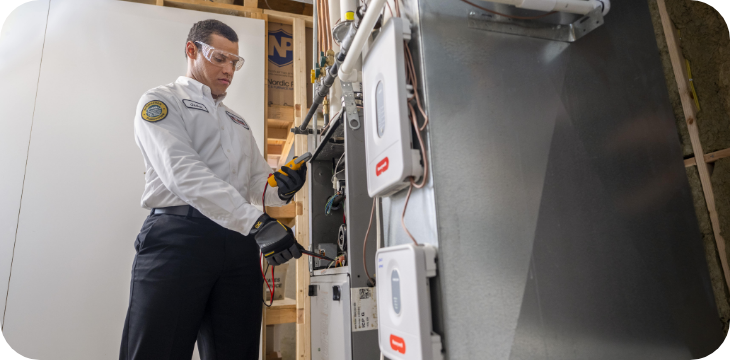High-Performance Systems Installed by DMAKS HVAC Technicians.
High-Performance Systems Installed by DMAKS HVAC Technicians.
Blog Article
Energy-Efficient HVAC Systems to Minimize Utility Costs
As energy costs continue to rise, the value of energy-efficient Heating and cooling systems ends up being significantly apparent. These systems not only promise considerable cost savings on utility costs but also contribute to an extra lasting future by minimizing energy usage.
Benefits of Energy-Efficient Heating And Cooling Systems
Energy-efficient HVAC systems use countless advantages that expand past mere price financial savings. By consuming much less energy, these systems add to decrease greenhouse gas discharges, aiding to deal with environment change and promote sustainability.
In addition, energy-efficient heating and cooling systems typically give boosted comfort degrees. A lot of these systems feature innovative modern technology that enables much better temperature control and improved air quality (DMAKS HVAC). This brings about a healthier interior setting, which is especially important for people with allergic reactions or respiratory concerns
Furthermore, spending in energy-efficient HVAC systems can improve home worth. As more consumers focus on power effectiveness, homes and buildings equipped with these systems may attract greater quotes in the property market.
Sorts Of Energy-Efficient A/c Options
Just how can home owners and services pick the most appropriate energy-efficient heating and cooling choices for their demands? The market provides a selection of energy-efficient a/c systems, each designed to improve convenience while reducing energy intake.
One alternative is the variable cooling agent circulation (VRF) system, which efficiently manages the temperature level in several areas within a structure. This system adapts its cooling agent flow to match the desired temperature level, leading to significant power financial savings.
An additional prominent choice is geothermal heatpump, which use the earth's steady temperature to heat and trendy areas. By transferring warm to and from the ground, these systems show remarkable performance, particularly in modest environments.
Furthermore, ductless mini-split systems offer an energy-efficient option for homes doing not have ductwork. These systems permit zone-specific heating and cooling, decreasing energy waste in vacant areas.
Last but not least, high-efficiency heaters and a/c unit, with advanced SEER and AFUE ratings, supply dependable climate control while eating much less energy than standard designs. By evaluating these options, home owners and companies can pick a HVAC system tailored to their details needs and power performance goals.
Trick Attributes to Consider

Next, examine the sort of compressor used in the system. DMAKS HVAC. Variable-speed compressors can change their output to match the home heating or cooling demand, leading to improved comfort and power savings contrasted to single-speed versions. Additionally, search for systems geared up with clever thermostats that provide programmable settings and remote access, enabling for better control over power usage
One more essential function is the system's air filtering capability. High-efficiency filters can boost indoor air top click resources quality and reduce power intake by ensuring the system runs efficiently. In addition, think about the kind of cooling agent utilized; modern-day systems frequently employ environmentally friendly refrigerants that have a lower ecological effect.
Finally, make sure that the system works with zoning innovation, which enables personalized temperature control in different areas of your home, enhancing comfort while minimizing power use.
Tips for Choosing the Right System


Next, consider energy efficiency ratings, specifically the Seasonal Power Efficiency Proportion (SEER) for cooling systems and the Yearly Fuel Application Performance (AFUE) for heater. Higher rankings show greater efficiency, which can result in significant financial savings on utility bills in time.
In addition, assess the kind of HVAC system that best matches your way of living and spending plan. Choices consist of central air conditioning, ductless mini-splits, and warmth pumps, each with its own set of advantages and downsides.
Do not overlook the significance of correct setup and sizing; an incorrectly sized system can cause inadequacies and raised wear. Seek advice from with a specialist HVAC specialist to obtain skilled referrals tailored to your home's unique demands. This comprehensive method will make sure that you pick an energy-efficient cooling and heating system that meets your requirements and spending plan effectively.
Maintenance for Optimal Effectiveness
Once the appropriate a/c system is in place, continuous maintenance ends up being essential to ensuring ideal performance and longevity. A properly maintained system operates a lot more successfully, leading to lower energy consumption and reduced utility costs. Routine inspections and tune-ups should be set up a minimum of two times a year-- once before the air conditioning period and as soon as prior to the home heating season.

House visit site owners need to likewise be attentive regarding checking their a/c system's performance. Uncommon sounds, fluctuating temperatures, or boosted energy expenses can suggest underlying concerns that need prompt focus. By dealing with these worries immediately, homeowners can avoid costly repair work and prolong the lifespan of their systems.
Buying a maintenance strategy with a certified technician not only enhances efficiency but additionally provides my link assurance, recognizing that the system is operating at its best. DMAKS HVAC. Routine maintenance is as a result vital for sustaining energy performance and decreasing overall functional prices
Conclusion
Finally, energy-efficient cooling and heating systems provide a feasible remedy for lowering energy costs while enhancing convenience and air top quality. By including advanced innovations and alternatives such as geothermal heatpump and ductless mini-splits, homeowner can achieve considerable energy financial savings and contribute to environmental sustainability. Mindful consideration of system functions and ongoing maintenance better guarantees optimal performance, making energy-efficient systems a sensible investment for both financial and ecological advantages.
Report this page